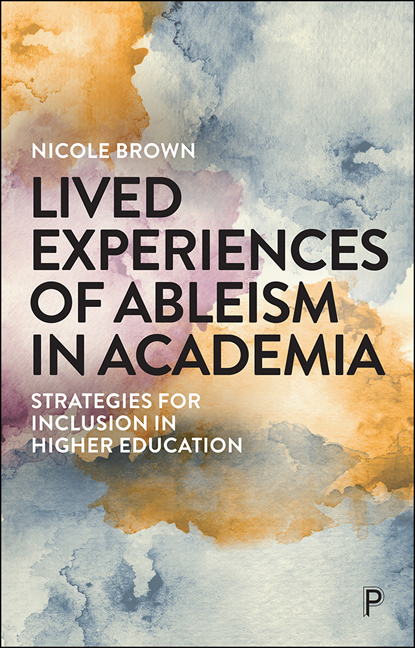8 - Deafness and hearing loss in higher education
Published online by Cambridge University Press: 18 December 2021
Summary
Introduction
June 2019
I am an invited guest speaker talking on the topic of ableism in academia.
I have held this talk on several occasions already, I know what I am going to say, and I am so attuned to what comes next, that I can include performative elements. Today, I find myself lingering a little bit longer than usual on the topic of conferences. I have already pointed out how difficult it is to navigate the lunch-time buffet if you have disabilities.
“Let's continue imagining. Here we are now with everyone else eating our food, and we would like to network with other conference delegates. But that won't be possible!”
I pause for effect, and pointing to the person signing furiously to my left, I finally add:
“Because the Sign Language interpreters are on their lunch break. Again, a shift in attitude is required. We tend to see the sign language interpreters to be there for the person who is deaf; but in reality, they are here because people like me cannot sign. The barrier is not the deafness, the barrier is my lack of language.”
After the entire talk, a number of attendees approach me to have a quick chat, ask questions and to thank me. I am happy talking and explaining. I am in my element; until the deaf delegate and his British Sign Language (BSL) interpreter come up to me. I greet them both, saying hello and thanking the interpreter for his help. I am utterly embarrassed. Apart from hello and thank you, I can say nothing. I had formal education in English, French, Latin and Spanish as foreign languages, so I get by in most European languages comfortably, and because I understand how the structure works, I pick up languages quickly. I manage to hold miniconversations and order food and so on in foreign languages even if I don't have any formal teaching, like I did in South Korea two years ago. And yet, I cannot speak BSL at all. I do speeches and presentations on ableism in academia, but I cannot communicate in BSL. I can lipread, and I can make sure I speak properly so others can lipread off me, but that is it.
- Type
- Chapter
- Information
- Lived Experiences of Ableism in AcademiaStrategies for Inclusion in Higher Education, pp. 141 - 158Publisher: Bristol University PressPrint publication year: 2021

